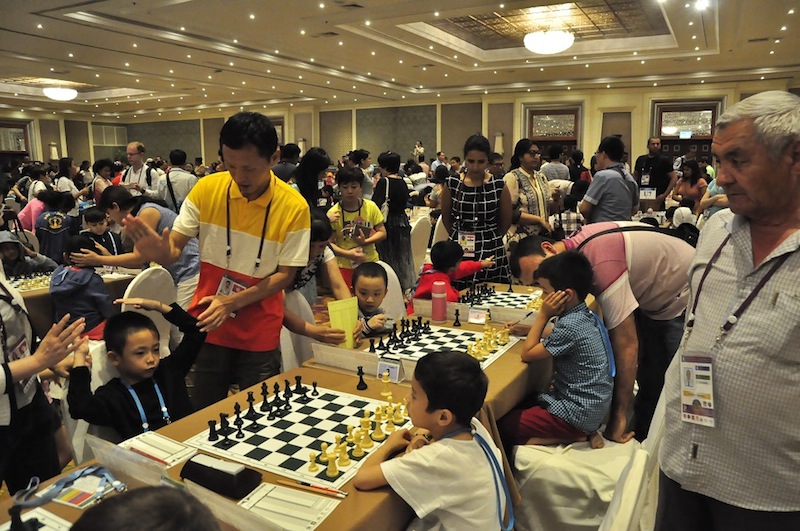MAY 14 — This week I am writing from the Dusit Thani Beach Resort in sunny Pattaya. Sunny days by the pool? It is quite a different reality when you are helping out (working?) at an international chess tournament.
The World Schools Individual Chess Championships is now in its final three rounds; I am handling the official website, but generally in charge of all things media including the “live” game broadcast although all credit for keeping things up and running smoothly goes to the Vietnam Chess Federation.
I am of course also an arbiter (that’s how it goes when working with friends) and good or bad that means full participation (attendance?) in all official activities, of which judging at social night was perhaps the most enjoyable!
Even though I have quite a lot of experience in such international age group youth competitions, there were still many lessons learned from this well organised World Schools Individual Chess Championships.
1. As the chief organiser told me, the biggest challenge was that of language and to effectively get translations to deal with on-the-spot disputes. This is especially crucial given that sometimes these involve very young children. Even after taking into account the numbers from each country and allocating resources while ensuring there was multilingual arbiter team, it was near impossible to keep ahead of the changing demographics of today’s world.
2. Then when speaking to the tournament director I realised a lot of the stress at the start and end of the event was less about getting the hall ready but organising the logistics of pick ups and transfers from airports to hotel and the reverse. It is not easy to even get confirmation of timing when there are over 800 people involved!
3. Going back to equipment, it is clearly always a challenge to transport huge numbers of chess sets and clocks from major cities (not to mention the various “decorations” that both visually make and also help “oil” the running of an event) and when the specifications are that which are demanded by FIDE (World Chess Federation) then there is the additional challenge of sourcing from friendly national chess federations and parties.
4. Of course it is also a major management issue to put together a team of people from different backgrounds, levels of expertise and varying experience to come and work as one. Naturally it is never as smooth as hoped and too often mistakes are made with varying consequences for the event. But when the intentions are right, there is almost always an acceptable solution to be found.

I, however, have very mixed feelings about an event such as this one.
Its always wonderful to see very young children enjoying themselves playing but on the other hand some are barely past beginner stage and can hardly make the moves or understand the rules of international competition.
It is horrible to see the flip side of a child’s joy at winning to the tears and even uncontrollable crying when losing. One cannot know if it is because the disappointment is too great or the expectations made too high and too often there is an angry out of control parent somewhere in the mix.
For schools championships, the categories begin at under seven and in odd years go right up to under-17 while the more highly regarded youth championships begin at under eight and in even years go right up to under-18.
I find it difficult to understand the rationale of putting kids at seven or eight into competition and think it is much better at world or continental championship level to perhaps start at 14 (certainly not any younger than 10).
I understand there was a point that it was proposed to FIDE to break up these events into two; one for under-seven to under-11 and another for under-13 to under-17 but then it was found that no one wanted the older age group categories.
Why? Because chess today at youth levels does not require sponsorship and are essentially funded by the money of indulgent parents and so there is certainly money to be made from the younger kids.
To every parent, their little one is wonderful but they forget they cannot choose chess but chess has to choose their child. And as I have found out in recent days, some parents (especially former professional women who are now the ladies who lunch) continue to believe everyone is to blame for their now near university-going child not becoming the superstar they believe their child should be, even in the face of overwhelming evidence to the contrary.
And so they rather viciously blame everyone and everything.
I see so much benefit from chess but also am aware of how much misery kids endure when their parents should really know better.
* This is the personal opinion of the columnist.






















